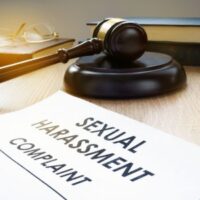EEOC Files Sexual Harassment Lawsuit Against FCA US LLC

When it comes to sexual harassment in the workplace, employers have an obligation to protect employees from such conduct. When they fail to protect their employees from sexual harassment, the worker can file a lawsuit or the company can end up being sued by the EEOC.
FCA US L.L.C., an international automobile manufacturer, violated federal law when it subjected female production employees to widespread sexual harassment, the U.S. Equal Employment Opportunity Commission (EEOC) recently charged in a lawsuit filed against the company.
According to the EEOC’s lawsuit, female employees at FCA’s Detroit Assembly Complex were sexually harassed by male supervisors and co-workers. The harassing conduct included sexually explicit comments and inappropriate touching. Some of the workers affected by the conduct complained to FCA. Hence, the EEOC charged that the company was aware of the harassment. FCA failed to act in response to the complaints or responded in an untimely or negligent manner, the EEOC charged. The company failed to discipline the harassers. The EEOC charged that the sexually hostile work environment spurred one of the victims to resign.
Such conduct violates Title VII of the Civil Rights Act of 1964, which prohibits sexual harassment in the workplace and requires employers to respond to allegations of sexual harassment. The EEOC filed suit in the U.S. District Court for the Eastern District of Michigan after first attempting to reach a pre-litigation settlement through its administrative conciliation process.
Understanding sexual harassment lawsuits
When an employee reports sexual harassment in the workplace, the employer is obliged to act on good faith reports. The employer must address the situation in some way and can be held liable if the conduct continues.
Title VII of the Civil Rights Act of 1964 makes it unlawful to harass an individual (such as an applicant or employee) because of that person’s sex. Harassment can include sexual harassment or unwelcome sexual advances, requests for sexual favors, and other verbal or physical harassment of a sexual nature. But it doesn’t need to be. Harassment can also include derogatory comments about women. For example, it’s illegal to harass a woman by making offensive comments about women in general.
Under the law, the victim or harasser can be either a man or a woman or of the same sex. The law doesn’t prohibit simple teasing, offhand comments, or isolated incidents that are not very serious. The conduct becomes illegal when it is so frequent or severe that it creates a hostile or offensive work environment or when it results in an adverse employment decision such as firing or demotion.
Lastly, the harasser can be an employee of the company or a member of the public like a customer or client.
Talk to an Atlanta, Georgia Sexual Harassment Attorney Today
Have you been sexually harassed in the workplace? Did your employer ignore your reports of misconduct or fire you? If so, you may be entitled to compensation. Call the Atlanta employment law attorneys at The Forsythe Law Firm, LLC today to submit your inquiry, and learn more about how we can help.
Source:
eeoc.gov/newsroom/eeoc-sues-fca-us-llc-sexual-harassment
